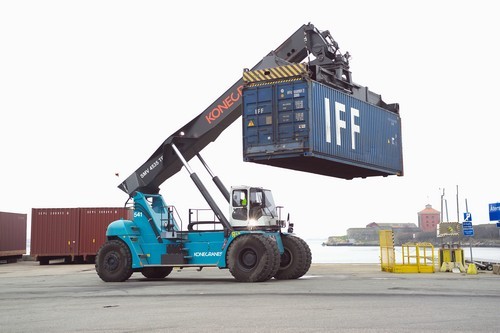 Konecranes' reachstacker |
Thai terminal operator TIPS Co. Ltd has ordered four reachstackers and three empty container handlers from Konecranes. The machines will be delivered in February 2009.
The order reaffirms Konecranes' continued growth in the Thai market. Ryan Flynn, Konecranes's director of ports in North East and South East Asia, says Thailand has been a growing market for the company since it first established there in 1993.
"It is now a major market that is very important to us because of its many heavy industries," he says. "We have built our infrastructure to cover Thailand with offices in several regions of the country, which allows us not only to be closer to the customer, but also to stay in constant communication while (installing) the product and providing service, parts and support."
"The economy is also experiencing solid growth and this has a positive impact on the port and logistics sector where we are seeing opportunities for our container-handling equipment," says Flynn.
Captain Chatchawan Ghettalae, general manager of TIPS, says the new reachstackers and empty container handlers will sustain TIPS's high level of customer service.
"We also see the order as a great opportunity for TIPS and Konecranes to benefit as we grow together in this global environment."
The machines will be used at Laem Chabang Port's B4 terminal, 130 kilometres south east of Bangkok.
The machines are equipped with the latest Konecranes technology and have load-sensing hydraulics which automatically calculate the power needed from the engine for the weight being lifted. This 'power on demand' variable rpm results in improved fuel efficiency.
Both empty handlers and reach stackers are also equipped with Konecranes's Eco-Drive system.
Flynn says that through this system, the customer can monitor many more aspects of the machine and its performance. "For example, TIPS would be able to track individual drivers and machines in terms of fuel consumption, productive hours, time spent driving versus lifting, number of containers lifted, to name a few.
"With rising fuel costs, customers are placing more emphasis on fuel-efficient container-handling equipment," says Flynn.